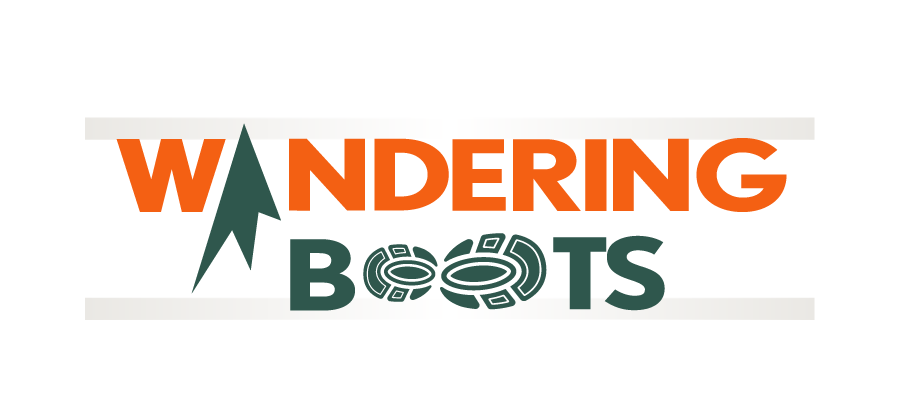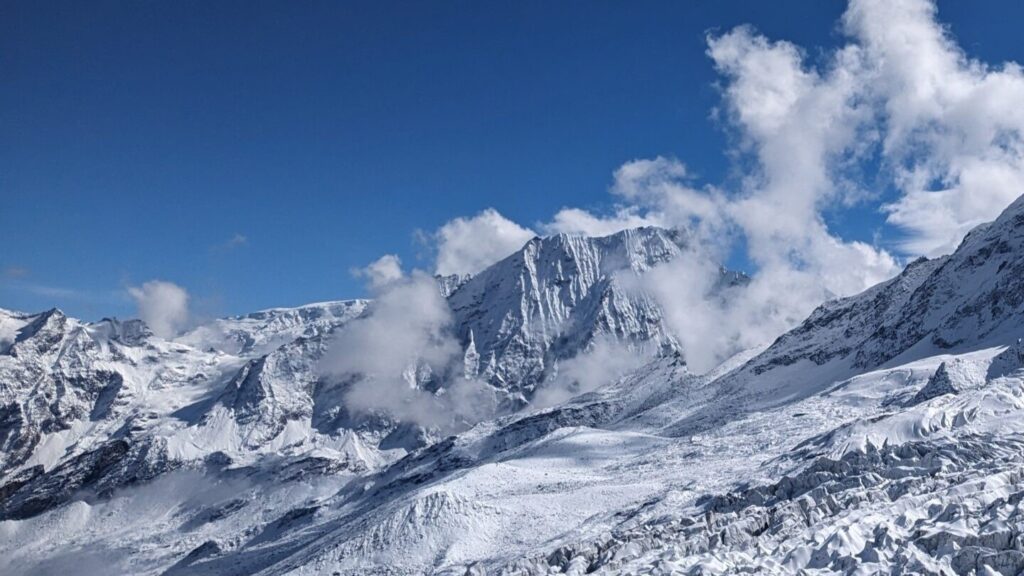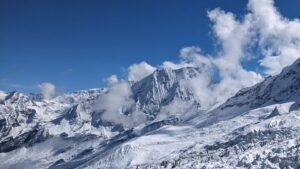- Overview
- Trip Outline
- Trip Inclusion
- Trip Exclusion
- Gallery
- Reviews
- Booking
- FAQs
The Trek
The Bada Bangal, also called as Shepherds trail trek, is a complete package for an accustomed trekker. It is one of the very few treks that offers the best of everything! This trek takes you through the heart of the mighty Dhauladhar range, one of the very few treks to do so. While on this trek you will cross the beautiful passes of Kalihani and Thamsar. Apart from being a challenging route , it will let you bask in the lush green beauty of Kullu and Kangra valley to the panoramic views of Pir Panjal, and Bada Bhangal ranges. Some of the peaks that one can see while on this route are Indrasan, Deo Tibba and Hanuman Tibba.
The Area
This area is one of the best kept secrets in Himachal. Passing through two of the most iconic districts in Himachal this trail takes you back in time. History goes that the inhabitants of this village were banished by the king of Chamba to live in the middle of nowhere. Over the years they were able to develop this settlement into a village!
Expected Weather
- Chances of rain/ hail - Mild to moderate rainfall can be expected.
- Snow on trail - Possible on passes.
- Temperatures - Day time temperature: Between 10°C and 25°C & Night time temperature: Between 0°C and 4°C at higher camps
- Day 1: Drive from Manali to Sangchar (2343 mts)
Drive distance: 30 km.
Trek from Sangchar to Mayali (3000 mts)
Trek distance: 6 kms; Trek time: 4 hrs
Overnight stay in tents.
- Day 2: Trek from Mayali to Riyali Thatch (3647 mts)
Trek distance: 9 kms; Trek time: 8 hrs
Overnight stay in tents
- Day 3: Trek from Riyali Thatch to Saghor (Kalihani Pass Base) (4000 mts)
Trek distance: 8 kms; Trek time: 6 hrs
Overnight stay in tents
- Day 4: Trek from Saghor (Kalihani Pass Base) to Donku Thach via Kalihani Pass (4725 mts)
Trek distance: 11 kms; Trek time: 10 hrs
Overnight stay in tents
- Day 5: Trek from Donku Thach to Devi Ki Marhi (3850 mts)
Trek distance: 9 kms; Trek time: 7 hrs
Overnight stay in tents
- Day 6: Trek from Devi Ki Marhi to Dal Marhi (3600 mts)
Trek distance: 8 kms; Trek time: 7 hrs
Overnight stay in tents
- Day 7: Trek from Dal Marhi to Bada Bangal (2550mts)
Trek distance: 15 kms; Trek time: 9 hrs
Overnight stay in tents
- Day 8: Rest day at Bada Bangal
Overnight stay in tents
- Day 9: Trek from Bada Bangal to Mardh (3830 mts)
Trek distance: 11 kms; Trek time: 7 hrs
Overnight stay in tents
- Day 10: Trek from Mardh to Dhaba camp (2721m) via Thamsar Pass (4875 mts)
Trek distance: 10 kms; Trek time: 8 hrs
Overnight stay in tents
- Day 11: Trek from Dhaba camp to Rajgundha (2440 mts) and drive to Bir (2400 mts)
Trek distance: 17 kms; Trek time: 10 hrs
Trek distance: 74 kms; Trek time: 3 hrs
Trek ends on reaching Bir
- Day 12: Buffer day
- All meals from Breakfast on day 1 to Breakfast on day 11.
- Complete stay and accommodation during the entire trek.
- Rentals for all common gear provided to you like tent, sleeping bags etc.
- Forest entry permission charges.
- Guide and expertise charges.
- Buffer day charges.
- 5% GST
- Meals or drinks purchased by participants during the travel or trek (example biscuits, fruits etc)
- Rentals for personal gear (Refer things to get section)
- Flight/ Train/ Bus ticket till Manali and back from Billing.
- Backpack offloading charges. You are expected to carry your own backpack. Trekkers unable to do so can opt for a porterage service at INR 500/day
Manali is well connected from Delhi/ Chandigarh. You have regular bus service from both Delhi and Chandigarh. The nearest airport is Kullu. One can take a cab from Kullu to Manali.You also get regular bus service from Kullu to Manali. Note, it is advisable to book a cab to avoid inconvenience.
Billing to Delhi/ Chandigarh - There are regular buses from Billing to Chandigarh. One can also get cabs.
A certified trek leader, a guide, cook & porters will accompany you during the trek.
Yes, this trek is ideal for first timers provided you train well.
We’ve been organizing treks for over five years and have had many female trekkers trek with us. In fact, a lot of them come solo for treks. There has never been a complaint about the atmosphere of a trek, about other trekkers or our professionalism. They have all been kind enough to leave a review.
You will be sleeping in twos or threes in your tents in sleeping bags. The sleeping bags are snug and comfortable. We will be providing inflatable pillows.
No. Guests are expected to carry their own power banks.
Through the trek, there are no bathing facilities at campsites. Trekkers often take advantage of running streams to freshen themselves up.
In all the camps where the accommodation is in tea houses/ home stays, there will be proper toilets. The toilets are mostly western, in case if they‘re Indian, then we try to provide a toilet seat most of the times.
On the day of camping, we will have toilet tents (with a dry pit toilet), the most hygienic way of answering nature’s call.
A dry pit toilet is an eco-friendly sanitation solution featuring a pit dug into the ground, topped with a toilet seat and a wrought iron stand. Near the toilet, a pile of mud, sand, or coco peat is provided for covering waste after use, facilitating rapid breakdown of fecal matter due to increased microbial activity. This method eliminates the need for water, thereby preventing contamination of nearby water sources, as water toilets are prohibited at campsites.
While toilet paper is available, please use it sparingly to avoid overloading the pit, which can take years to decompose. Please refrain from using wet wipes as they are not biodegradable or use biodegradable wipes.
Yes, you are ideally expected to carry your backpack. But you do have an option of offloading your bags on a mule for an additional cost. The cost will be INR 400/ per day per bag (weight not exceeding 8kg). One is expected to inform us about offloading 1 week prior to the trek.
1. Good Sturdy Backpack: Prefer a trekking pack over a backpacking one. The size of the backpack depends upon the participant. Normally for a 7-9 day trek a 50-60 litre pack should suffice.
2. Shoes: Any waterproof trek (not hike) shoe would be ideal.
3. Socks: 3 pair cottons and 3 pairs of woollens.
4. Trek pants (ideally water resistant): Get two quick dry summer trek pants. On summit climb or a major altitude gain day for Goechala, Rupin and Stok), you can replace one dry fit trek pant with Shell trekking pants. If you don’t have trek pants you can replace it with Gym track pants.
5. T-shirt/ Base layer: Get 3 T-shirts/ trekking base layer on the trek, one of which should be thick and full sleeve. Avoid cotton and prefer dry fit.
6. Fleece/ Sweater/ good quality Hoodie: Get 1 fleece jacket or sweater. Fleece is preferred over sweater or hoodie as it is lightweight and easy to carry. Sweaters and Jackets can be heavier than Fleece for the warmth they offer.
7. Down/ Padded Jacket – Down/ Padded jacket (Upto -5 degrees). If you don’t want to get a padded/ down jacket, get two fleeces.
8. Cotton track pants for camp – These are specifically for cold evenings at the campsite. This can be ignored if you are comfortable wearing your trekking pants in the camp.
9. Thermals: 1 pair. We wear thermals only upon reaching the campsite not while trekking.
10. Windproof Jacket: All rain proof can be used as Wind proofs. Required as an additional layer during trekking in windy conditions. Avoid if you have a rain proof jacket.
11. Rainwear:
Option A – Rain set – One Waterproof jacket (3000 mm waterproofing), Rain proof pants and Bag cover
Option two – Poncho that covers your body and bag completely.
We ideally recommend Option 1 as poncho makes trekking difficult.
12. Woolen Cap/ Balaclava-1: To cover your ears, head and neck. Get one woollen cap and one neck warmer or balaclava.
13. Neck Warmer/ Scarf-1: For evenings. Avoid if you are comfortable using a Balaclava.
14. Gloves: 2 gloves out of which 1 can be water proof and one woollen. The waterproof one has to ideally be padded and a size larger than you normally use. This is so that you can wear both your gloves together if required.
15. Suncap – 1
16. Sunglasses – 1
17. Toiletries – Also include sunscreen, moisturizer and lip-cream
18. Headlamp/Torch -1. Preferably headlamp.
19. Two water bottles (1 litre each) – One can be a thermos flask. One can also get a hydration pack.
20. Camp shoes/ Flip flops for camp
21. Plastic covers for inside the backpack to keep your clothes dry
22. Daypack – Required if you have a summit days climb. Preferably one that can be compressed.
23. Documents: 2 passport sized photograph, Address and Photo proof (Driving License or Aadhaar card), Doctor’s medical certificate saying that you are fit for the trek. We reserve the right to not take you on the trek if you fail to produce this.
24. Trekking pole
You can prepare for the trek with a combination of Cardio & Strength activities
4-5 kms slow jog OR 6-7 kms Brisk walking OR 25 kms cycling. Pace is not important, consistency is important (non-stop jogging/running/cycling)
Squats 20 x 3, Lunges 20 x 3, Calf raises 20 x 3
All of the above at least 4 times a week
Climbing stairs 40 floors with backpack (Atleast once a week)
Most wild animals are naturally wary of human activity and prefer to stay in more remote, quieter parts of their habitat. Here’s why wild animals typically do not approach camps.
The common perception is that alcohol makes you feel warmer, however it also dehydrates you & dehydration can be fatal while trekking. Hence consumption of alcohol is prohibited. Smoking in camps is not allowed.
If you cancel –
– 60 days before the trip: we can process a complete refund minus minimum processing charges.
– Between 30-45 days before the trip: you will be refunded 50% of the trek fee.
– Within 30 days before the trek starts: No refund.
– If your spot is replaced in a full batch: we will process a complete refund after canceling minute operational charges. (For fixed departures only)
























































There are no reviews yet.